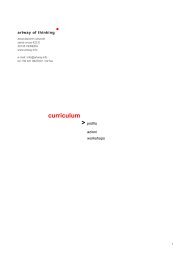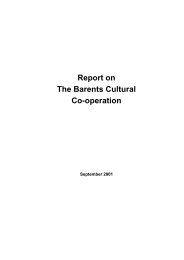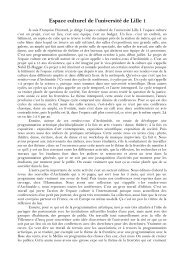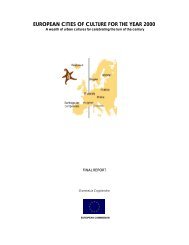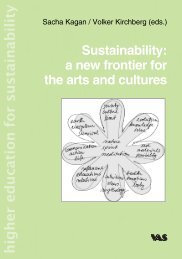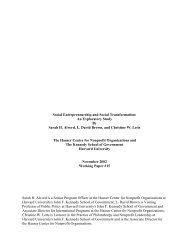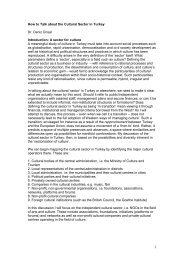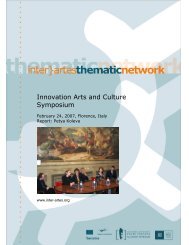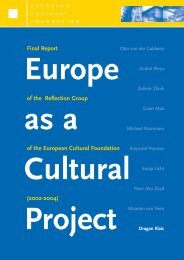A guide to the export and import of cultural goods between Russia ...
A guide to the export and import of cultural goods between Russia ...
A guide to the export and import of cultural goods between Russia ...
Create successful ePaper yourself
Turn your PDF publications into a flip-book with our unique Google optimized e-Paper software.
Italy<br />
Chapter 3: European Union Member States<br />
How do I find out if <strong>the</strong> art object I want <strong>to</strong> <strong>export</strong> is <strong>of</strong> national significance? Is <strong>the</strong>re a Public<br />
Inven<strong>to</strong>ry <strong>of</strong> <strong>cultural</strong> <strong>goods</strong> <strong>of</strong> special interest or <strong>import</strong>ance?<br />
Export <strong>of</strong> all <strong>cultural</strong> <strong>goods</strong> which are protected under <strong>the</strong> Italian Code is restricted although<br />
<strong>the</strong>re is no national inven<strong>to</strong>ry <strong>of</strong> <strong>goods</strong> <strong>of</strong> national significance.<br />
Are <strong>the</strong>re any exemptions for particular <strong>cultural</strong> <strong>goods</strong>?<br />
Under <strong>the</strong> Italian Code, works <strong>of</strong> art by living artists do not require permission (in <strong>the</strong> form<br />
<strong>of</strong> a Certificate <strong>of</strong> Circulation). However, such contemporary artworks do still come under<br />
<strong>the</strong> jurisdiction <strong>of</strong> <strong>the</strong> Code (Article 65) <strong>and</strong> <strong>the</strong> <strong>export</strong>er must demonstrate <strong>to</strong> <strong>the</strong> <strong>export</strong><br />
<strong>of</strong>fice that <strong>the</strong> <strong>goods</strong> are indeed <strong>the</strong> work <strong>of</strong> a living artist.<br />
The same would apply <strong>to</strong> a work <strong>of</strong> art by an artist who is deceased, where <strong>the</strong> work was<br />
created less than 50 years ago but <strong>the</strong> artist’s production period was less than 50 years.<br />
This would have <strong>to</strong> be proved <strong>to</strong> get authorisation for <strong>the</strong> <strong>export</strong> <strong>of</strong> <strong>the</strong> work.<br />
Do museums <strong>and</strong> galleries need licences for temporary <strong>export</strong>s (e.g. a <strong>to</strong>uring exhibition)? Do<br />
non-pr<strong>of</strong>it organisations need <strong>export</strong> licences?<br />
Yes. Museums, galleries <strong>and</strong> non-pr<strong>of</strong>it organisations must apply for licences. Cultural<br />
<strong>goods</strong> that fall under <strong>the</strong> categories described in <strong>the</strong> Italian legislation <strong>and</strong>/or EU <strong>export</strong><br />
licence legislation must be covered by an <strong>export</strong> licence, whatever <strong>the</strong> type <strong>of</strong> applicant<br />
or purpose. The Italian legislation restricts <strong>the</strong> <strong>export</strong> <strong>of</strong> any <strong>cultural</strong> objects which belong<br />
<strong>to</strong> collections <strong>of</strong> museums, galleries or o<strong>the</strong>r public institutions.<br />
The Italian Code (Article 66) allows for authorisation for <strong>cultural</strong> <strong>goods</strong> <strong>to</strong> leave Italy on<br />
temporary <strong>export</strong> for “art events, exhibits or expositions <strong>of</strong> great <strong>cultural</strong> interest, on condition<br />
that <strong>the</strong> integrity <strong>and</strong> safety <strong>of</strong> <strong>the</strong> (objects) are ensured”.<br />
Temporary <strong>export</strong> is permitted for analysis <strong>and</strong> conservation work which must be carried<br />
out abroad. It can also be granted for reciprocal agreements under <strong>cultural</strong> accords with<br />
foreign museums.<br />
A Certificate <strong>of</strong> Temporary Circulation is valid for 18 months.<br />
I am a visual artist. Do I need a licence <strong>to</strong> <strong>export</strong> my own work?<br />
No. Art work which belongs <strong>to</strong> “<strong>the</strong> origina<strong>to</strong>r” (i.e. <strong>the</strong> artist who created it) does not require<br />
an <strong>export</strong> licence under <strong>the</strong> EU <strong>export</strong> licence legislation, whatever its age or value. Therefore<br />
you do not need an EU licence <strong>to</strong> <strong>export</strong> your own work if you still own it yourself.<br />
However, <strong>the</strong> Italian Code may still apply <strong>and</strong> you should take advice on this.<br />
I am a musician. Do I need <strong>to</strong> know about <strong>export</strong> regulations if I am travelling with my instrument?<br />
Yes. Any musician who wishes <strong>to</strong> travel outside <strong>the</strong> European Union with a musical instru-<br />
130



